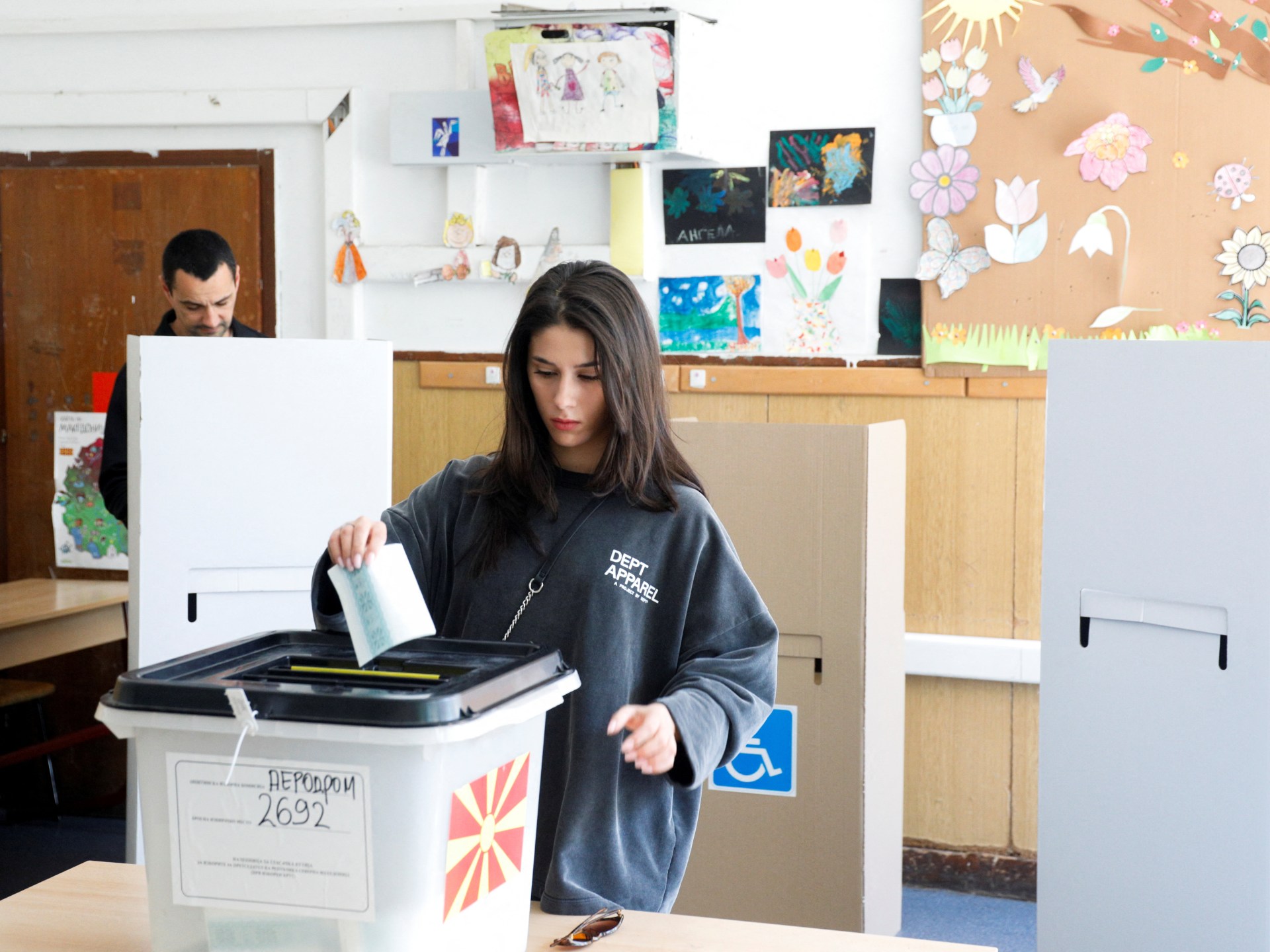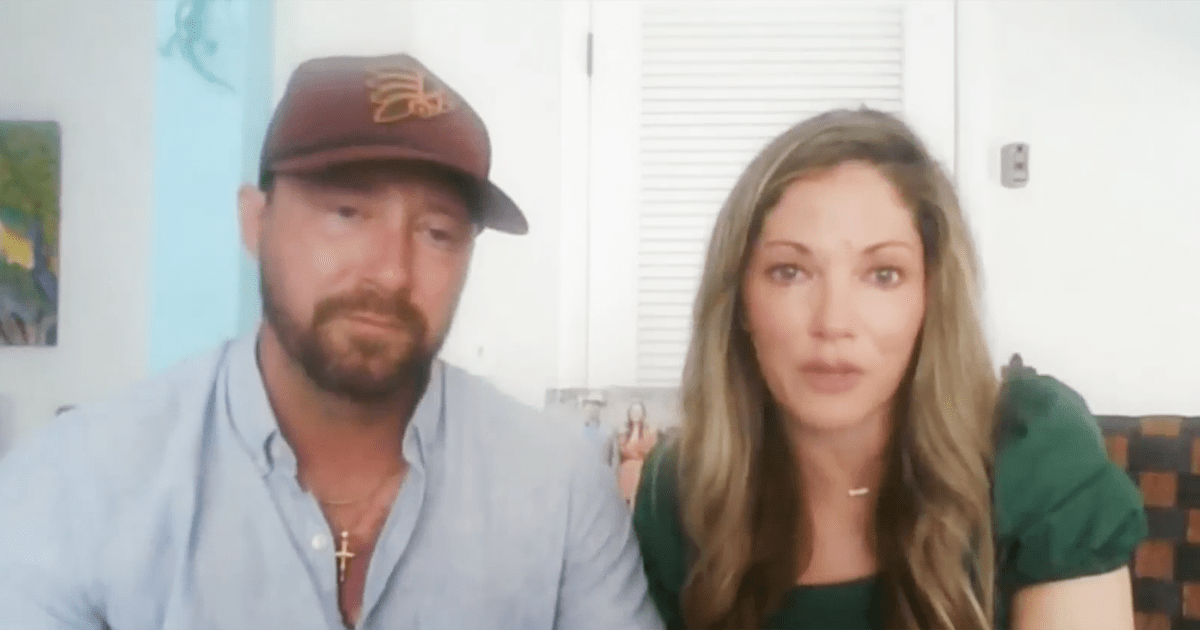Politics
Amid book ban fight, Newsom blasts school board president as ‘ignorant’ for calling Harvey Milk ‘a pedophile’
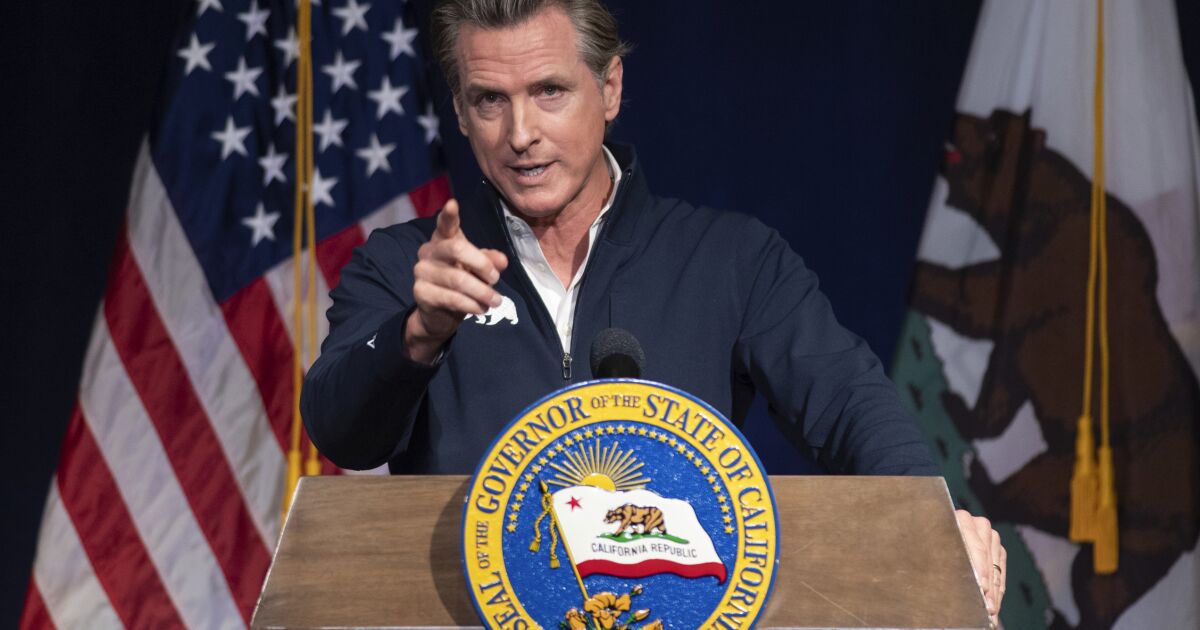
Gov. Gavin Newsom blasted a Temecula school board president who voted along with a majority of the panel to reject a curriculum because a textbook mentioned gay rights activist and San Francisco politician Harvey Milk.
During a public hearing on the curriculum, Temecula Valley Unified School District board President Joseph Komrosky called Milk a “pedophile.” In a Twitter post, Newsom fired back, calling Komrosky “ignorant.”
The feud has erupted amid a nationwide trend of book bans and attacks against schools for supporting the LGBTQ+ community.
A majority of Temecula Valley Unified’s five-person board rejected on May 16 a new social studies curriculum, which included a textbook that would be assigned to the district’s 18 elementary schools in southern Riverside County.
A supplemental section of the book includes a biography of Milk, a pioneering gay activist who served on the San Francisco Board of Supervisors in 1977. He was gunned down, along with Mayor George Moscone, the following year by a disgruntled former city supervisor.
The Temecula school board’s conservative majority claimed that parents did not have enough involvement in approving the social studies textbook, and two members — including Komrosky — said they opposed the book because of the section on Milk.
“My question is, why even mention a pedophile?” Komrosky asked during a hearing on the subject.
Members of the audience stammered in response and some shook their heads in video from the board meeting.
Board member Allison Barclay said, “He’s not a pedophile.”
“I beg to differ,” Komrosky said. “What does that got to do with our curriculum and schools? Why?”
Milk’s work focused on protecting classes of people from discrimination, including the LGBTQ+ community, Barclay said.
Komrosky asked, “So, you think pedophilia is protected?”
“Excuse me, absolutely not,” Barclay said. “I am not talking about pedophilia.”
Komrosky, who is a tenured college professor at Mt. San Antonio College, did not respond to requests for comment.
In a Twitter post Saturday, Newsom fired back at Komrosky.
“An offensive statement from an ignorant person,” the governor wrote. “This isn’t Texas or Florida. In the Golden State, our kids have the freedom to learn. Congrats Mr. Komrosky you have our attention. Stay tuned.”
The governor’s office did not immediately respond to requests for comment about how the state would respond, but last week, Newsom’s office, along with Atty. Gen. Rob Bonta, and California Supt. of Public Instruction Tony Thurmond called on school officials across the state to be careful around the topic of book bans.
“In the first half of this school year alone, 1,477 books were banned nationally, with teachers and librarians threatened with prison time for shelving the wrong book,” the officials wrote in their letter.
“As state leaders elected to represent the values of all Californians, we offer our response in one shared voice: Access to books — including books that reflect the diverse experiences and perspectives of Californians, and especially, those that may challenge us to grapple with uncomfortable truths — is a profound freedom we all must protect and cultivate,” the joint letter said.
The letter did not directly address the vote in Temecula, but warned that if school administrators in California remove or ban instructional materials from classrooms or libraries, the state may request information about the removal for analysis.
Before the Temecula school board rejected the social studies textbook, roughly 1,300 students were involved in a pilot program, using the curriculum material, and 45 parents responded to a survey asking for feedback about the curriculum, according to district staff.
Also, 47 teachers agreed that the district should adopt the textbooks California Studies Weekly for kindergarten students and TCI Social Studies Alive for first- through fifth-grade students.
The board shot down the adoption in a 3-2 vote. Board members Jennifer Wiersma, Danny Gonzalez and Komrosky voted against the curriculum, while board members Steven Schwartz and Barclay voted in favor.
Without the approval of the new curriculum, the district will be short of the books needed for students, which could run afoul of a California law that requires enough instructional materials, such as textbooks, be provided for every student.
Edgar Diaz, president of Temecula Valley Educators Assn., said having no materials means that teachers would need to find their own.
“There’s a tremendous amount of work to go out and do,” Diaz said.
The board did not offer any alternatives aside from rejecting the new textbooks, Diaz said, leaving the district stuck until a new decision is made.
“If they don’t, we’re going to have 11,300 students without textbooks next year,”
The educators organization, an advocacy group, plans to rally outside the next board meeting on June 16.
Wiersma, Gonzalez and Komrosky were voted into office last year, with the endorsement of the Inland Empire Family PAC, which aims to support candidates who oppose critical race theory, LGBTQ+ acceptance and the promotion of transgenderism, according to the political group’s website.
In December, the board banned teaching critical race theory in the school district.
Lawmakers in Sacramento are now considering a bill by State Assemblymember Corey Jackson (D-Riverside) that would require a super majority vote from a school district’s governing body to remove a book from a school’s curriculum. Assembly Bill 1078 also would create an appeal process for parents to challenge a book ban.
“As a Christian myself, I am deeply appalled that these individuals are perverting our faith to sow division and suppress the histories of others,” Jackson said in a statement. “This will not happen on my watch.”
Times staff writer Saumya Gupta contributed to this report.

Politics
Inside an Arizona abortion clinic: Uncertainty looms and optimism reigns
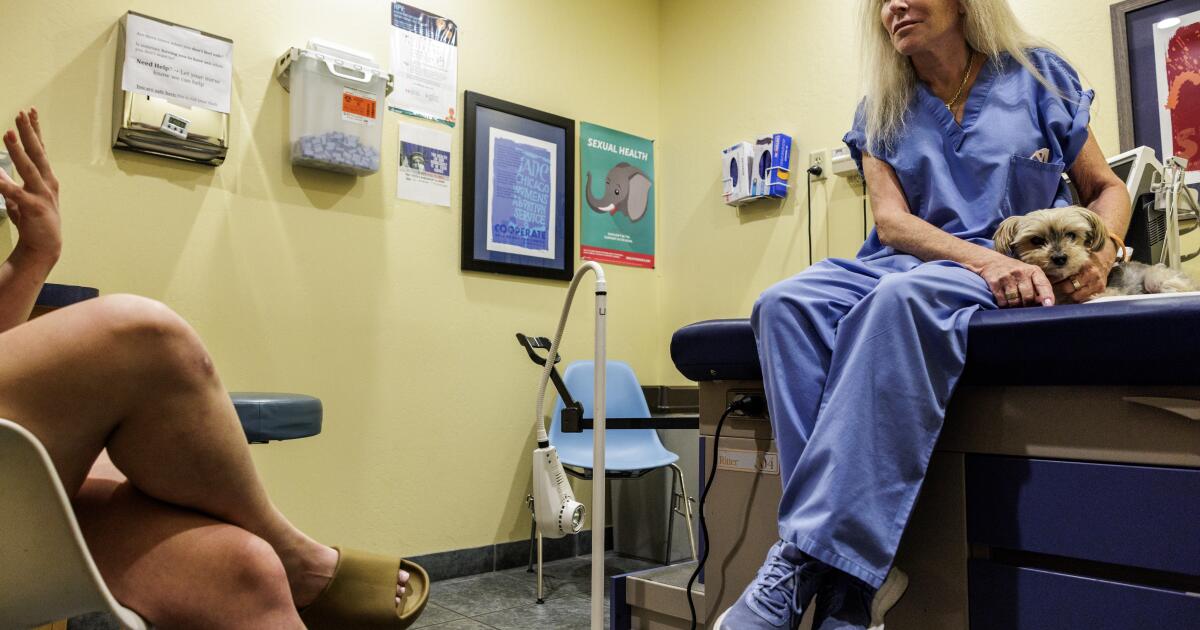
When Anna first read about the Arizona Supreme Court reinstating an 1864 law banning all abortions except when a mother’s life is at risk, she sent the article to her partner with an angry text.
“I was like, ‘God, this makes me so mad,’” she said.
She also decided to take a pregnancy test, just in case. Her period was a few days late, which she figured was because of her new birth control pills.
“I just want to make sure before anything goes into effect,” said Anna, 24, who declined to give her last name. “Thank God I did.”
Days later, she found herself at Camelback Family Planning, discussing her options for an abortion.
The April 9 ruling set off a political hurricane, with both President Biden and former President Trump weighing in and Arizona’s Legislature devolving into chaos over whether to repeal the ban before it goes into effect June 8. But at a Phoenix abortion clinic, in the eye of the debate, it has been business as usual.
On Wednesday, Dr. Barbara Zipkin breezed into an examination room carrying Scooter, her emotional support dog. Although she lives in Sherman Oaks, Zipkin flies to Arizona most weeks, staying at her sister’s house while working three to five days at the Camelback clinic.
With her support dog Scooter staying in his bed, Dr. Barbara Zipkin rushes to an exam room at Camelback Family Planning on April 18, 2024, in Phoenix. The clinic will have to cease performing abortions on June 8 if the 1864 law banning abortions isn’t delayed of overturned.
The doctor, who said she is “somewhere between 40 and death,” recalls the moment in 1973 when Roe vs. Wade took effect: She was on a plane returning to medical school, and she thought, “This is what I’m going to do.” She worked for years as an OB-GYN in Los Angeles, specializing in genetics and performing a lot of second trimester abortions.
“But there are enough providers in L.A.,” she said. “Arizona is unique.”
In the exam room, Zipkin walked Anna through her options — a medication abortion, which the patient had previously experienced with a difficult recovery, or a surgical procedure. Then Zipkin recited a state-mandated “silly consent” form, adding her own caveats to each point.
“Consent says the state of Arizona wants you to believe that there are alternatives to abortion. Well, that’s all well and good, but it’s not really true, because when you’re in this position, you really only have two options. One is carry it and the other is don’t carry it,” Zipkin said. “Adoption and all that — that comes after. You’re either carrying this or you’re not, and it still affects you.”
Anna said she’d always paid attention to the national conversation around abortion, as a woman and especially as an Arizonan. Anna said she had started taking birth control pills within a week of getting pregnant. As a 24-year-old who lives with roommates, she doesn’t consider herself financially able to care for a child.
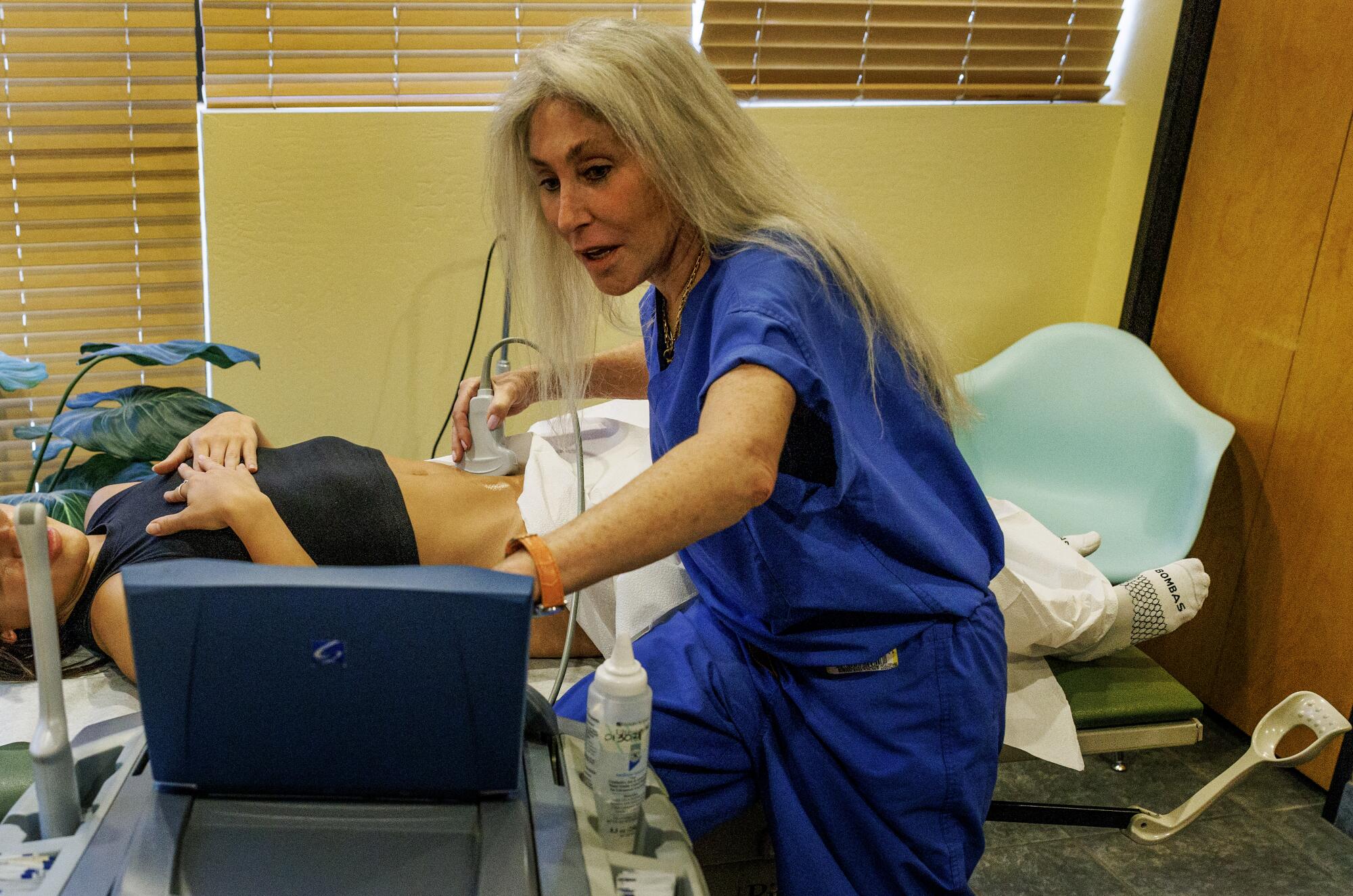
Dr. Barbara Zipkin performs an ultrasound on a 25-year-old patient who didn’t want her name or face shown at Camelback Family Planning on April 18. The patient thought the Arizona 1864 law banning abortion had already taken effect and was planning on going to California for an abortion but she learned that the clinic in Phoenix was still open and performing abortions. “It makes me sad to think that women in the future may not be to have the choice to come here if that law goes into effect,” she said.
“It’s just not the situation I want for myself, or my children in the future. I want a two-parent household in a stable home, or a stable situation,” Anna said. “I just don’t know that I’m in that right now.”
After her 10-minute consultation with Zipkin, Anna scheduled an appointment for the following week, when she would decide whether to have a medication or surgical abortion.
After answering Anna’s questions, Zipkin offered her last bit of guidance: “Before I forget, because I have the attention span of a gnat — vote!”
Abortion is likely to top voters’ concerns in Arizona, where state legislators have yet to vote on a proposed bill repealing the ban.
In the sunny plaza between the two state Capitol chambers, protesters on both sides of the debate milled about Wednesday, some wearing bright orange T-shirts in support of Arizona for Abortion Access, and others in shirts depicting baby’s feet and proclaiming “Choose life.”
Uncertainty at the clinic
Back at the Camelback clinic, staff members gathered in the break room, decorated with posters and handmade thank you cards, including one with a uterus drawn in place of a “Y.” They discussed what could happen after June 8, and the clinic’s founder, Dr. Gabrielle Goodrick, sought to provide clarity.
1
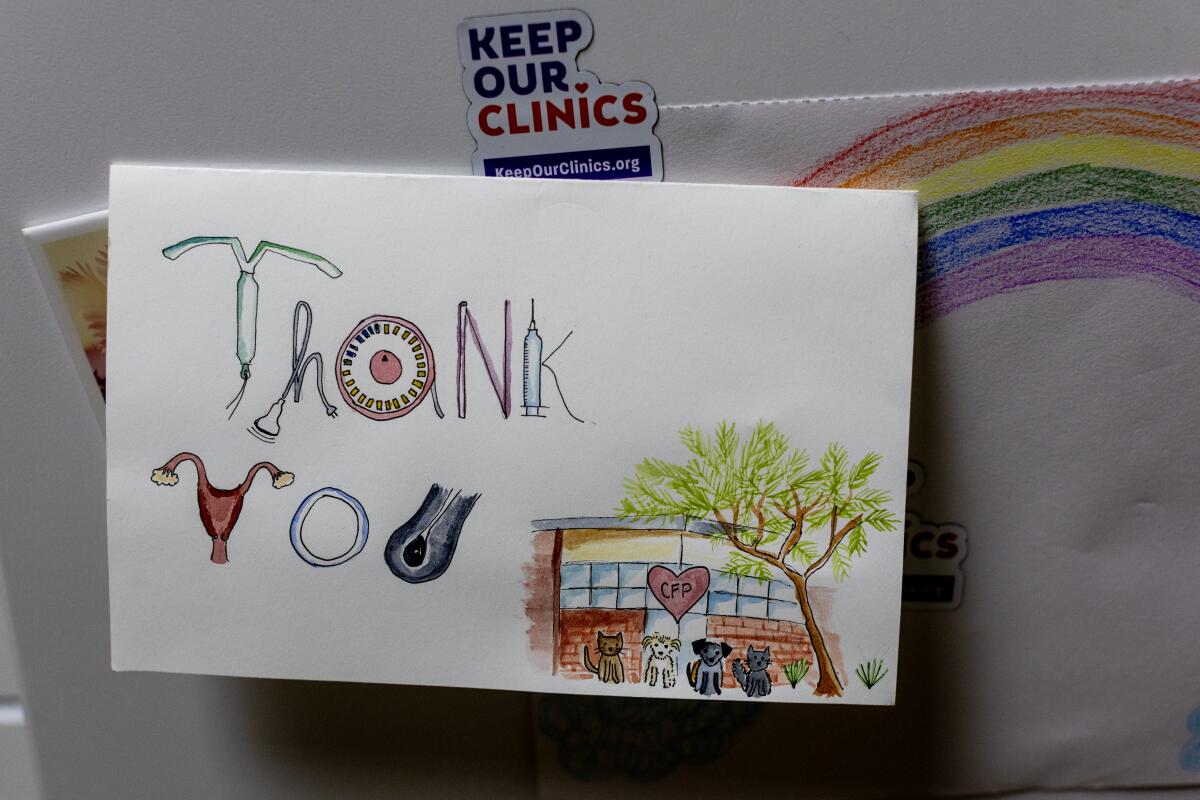
2
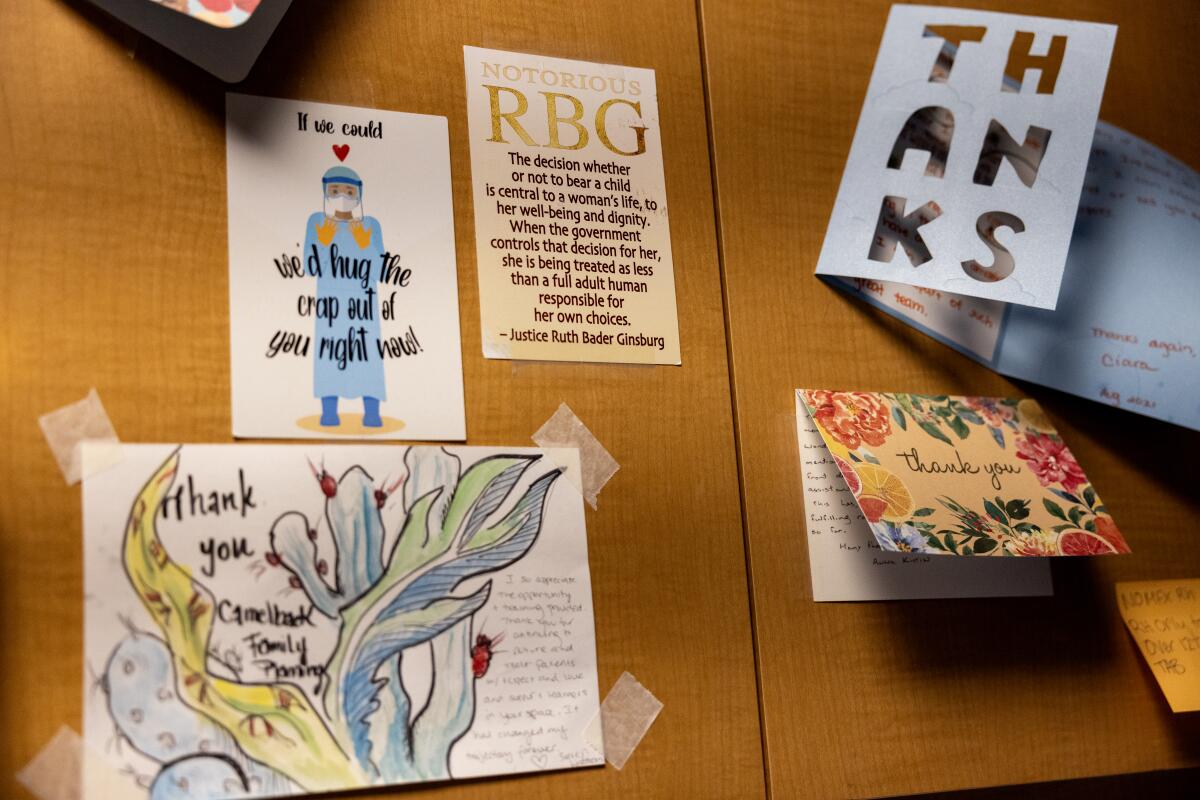
3
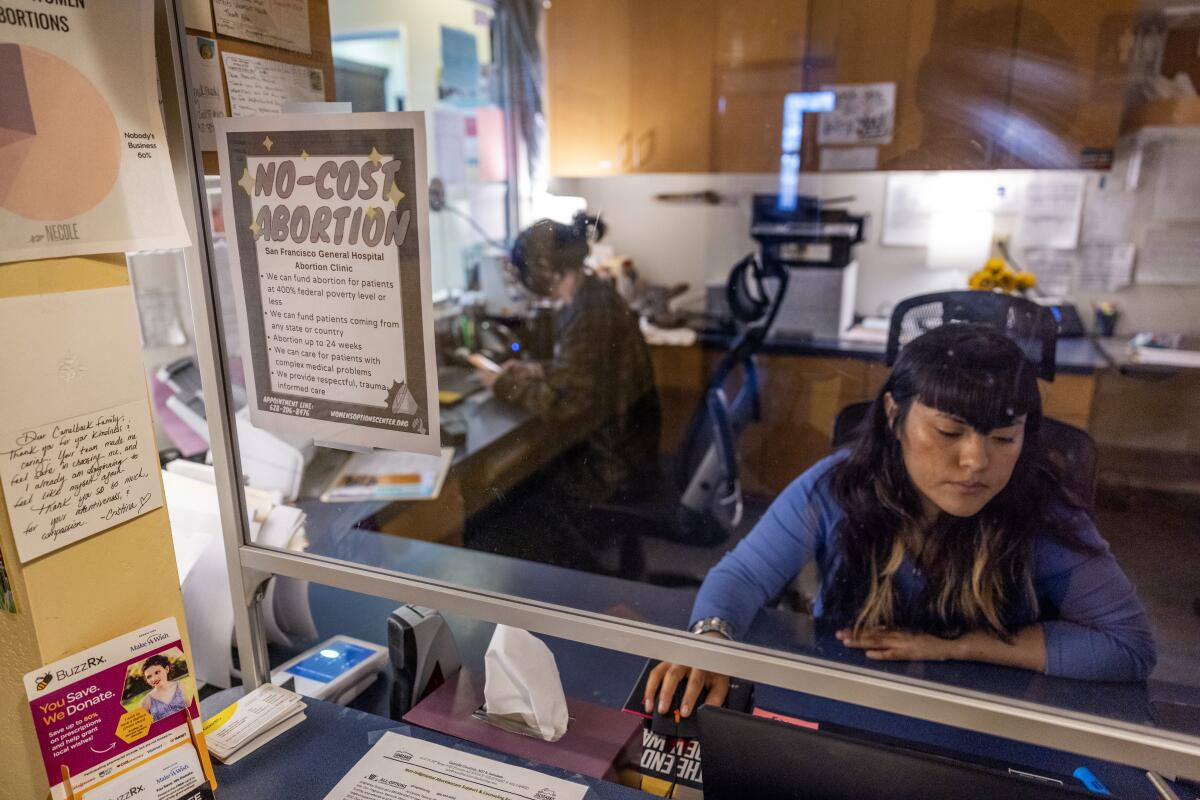
1. A Thank You card hangs on the refrigerator in the beak room at Camelback Family Planning on April 17, 2024 in Phoenix, Arizona. The clinic will have to cease performing abortions on June 8 if the 1864 law banning abortions isn’t delayed or overturned. 2. A Thank You cards hang on a cupboard at Camelback Family Planning on April 18, 2024 in Phoenix, Arizona. The clinic will have to cease performing abortions on June 8 if the 1864 law banning abortions isn’t delayed or overturned. 3. Information on a no-cost abortion clinic in San Francisco hangs on the glass at the reception area at Camelback Family Planning on April 18, 2024 in Phoenix, Arizona. The clinic will have to cease performing abortions on June 8 if the 1864 law banning abortions isn’t delayed or overturned.
She’s hopeful that a constitutional amendment guaranteeing abortion access will be on the November ballot — activists with Arizona for Abortion Access say they have gathered enough signatures.
“People were pretty nervous and stressed that they’re not going to have a job until November,” Goodrick said.
For a clinic rocked by Supreme Court decisions, it has become adept at weathering changes, Goodrick said. A ruling comes down, the staff adjusts its routines and schedules and continues to provide abortions with new limitations, which sometimes includes referring patients to clinics in California or Nevada.
The constant fluctuations have had their toll, though. The clinic, which Goodrick opened in 1999, usually averages about 350 patients a month. That total dropped in 2022 amid patient confusion over what would happen in the wake of Roe vs. Wade being overturned. Her small staff of 12 shrank to six, Goodrick said, as workers grew tired “from the stress of just not knowing.”
The doctor and her staff had just gotten into the swing of their new routine when the state Supreme Court ruling came down.
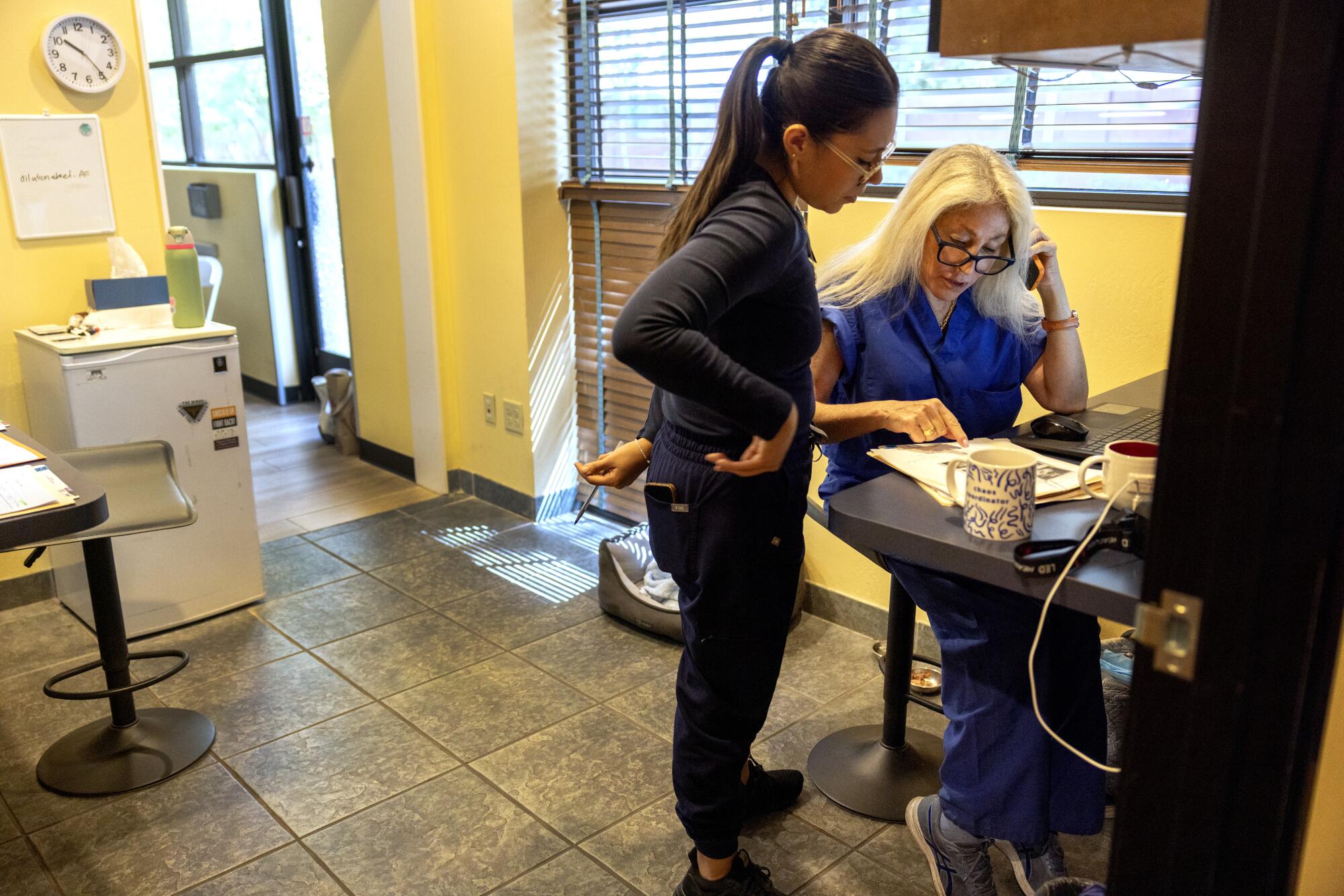
Dr. Barbara Zipkin, right, consults with a co-worker over ultrasound results at Camelback Family Planning . The clinic will have to cease performing abortions on June 8 if enforcement of the 1864 law banning abortions isn’t delayed or overturned.
“The patients are more anxious,” Goodrick said. “It causes what the Republicans want, which is mayhem.”
But this time, she hopes, will be different.
“We just have to get to Nov. 25,” Goodrick said, referring to the date that a constitutional amendment, if approved, would take effect.
Confident that the political fight will turn in her favor, Goodrick has opened the clinic’s doors to media from around the globe, who’ve descended on Arizona to chronicle the latest front in a nationwide battle over abortion.
Nurses wearing “abortion is healthcare” T-shirts moved deftly around the journalists, whom they’ve grown accustomed to filling their workplace recently. On their lunch break, the staff crowded into the break room, bickering over Supreme Court justices.
“Which one’s worse — [Clarence] Thomas or [Samuel] Alito?” one asked.
Sitting at a folding table laden with snacks, Dr. Jessica Holmes peered at the clinic’s schedule on her laptop.
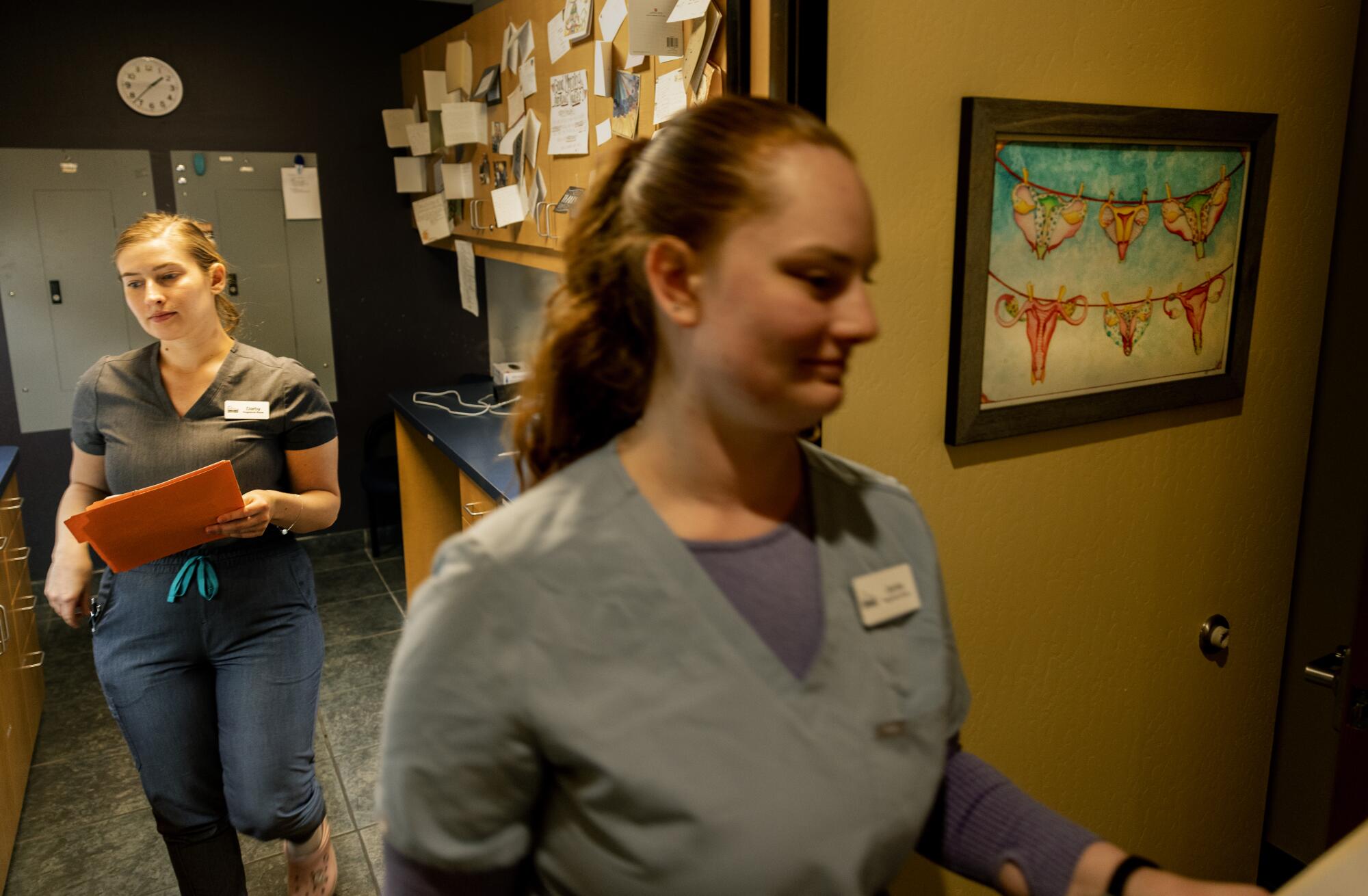
Nurses carry charts to exam rooms past thank you cards tacked to cupboards and artwork of a uterus hanging on a clothesline at Camelback Family Planning.
“Are you doing through June, or only the first eight days?” Holmes asked.
“No, we’ll go through June,” Goodrick answered briskly.
Opposing forces of optimism
Standing on the sidewalk a few yards from the clinic door, antiabortion activists were similarly optimistic about the future of Arizona’s abortion law.
“We accept it as a victory and we’re very excited,” said Matt Engelthaler, 49, who has protested abortions since he was a teenager, when he first joined his parents to pray outside clinics. “But we also realize that changing laws isn’t what’s gonna do anything, it’s just changing hearts. That’s what we pray for.”
Engelthaler fingered rosary beads as he held a sign that said, “Choose life.” A Catholic, he said he prayed the rosary “for the moms, dads and the babies,” and another prayer for the abortion clinic workers, “that they can understand the travesty of what they’re doing and turn away from it.”
A passing car honked, and the driver stuck his middle finger in the air at the protesters.
“People just don’t know how to do the peace sign correctly,” Engelthaler said with a laugh.
A few minutes later, another car honked and the driver gave a thumbs up.
By the clinic door, three volunteers wearing bright, rainbow-colored vests escorted patients from their cars into the clinic, blocking their view of the sidewalk protesters with large, rainbow umbrellas. Michael Buble played on a nearby speaker, ready to drown out any protester’s megaphone.
“When they go loud, we go louder,” said one escort, who declined to give her name. She said her group of volunteers would continue serving at the clinic until they’re told to stop.
One of the patients, a 26-year-old from Phoenix, said the escorts’ music lifted her spirits on an otherwise bleak day. She took Scooter into her arms and, stroking the dog’s back, told the doctor that she found out she was pregnant two days after the state Supreme Court decision.
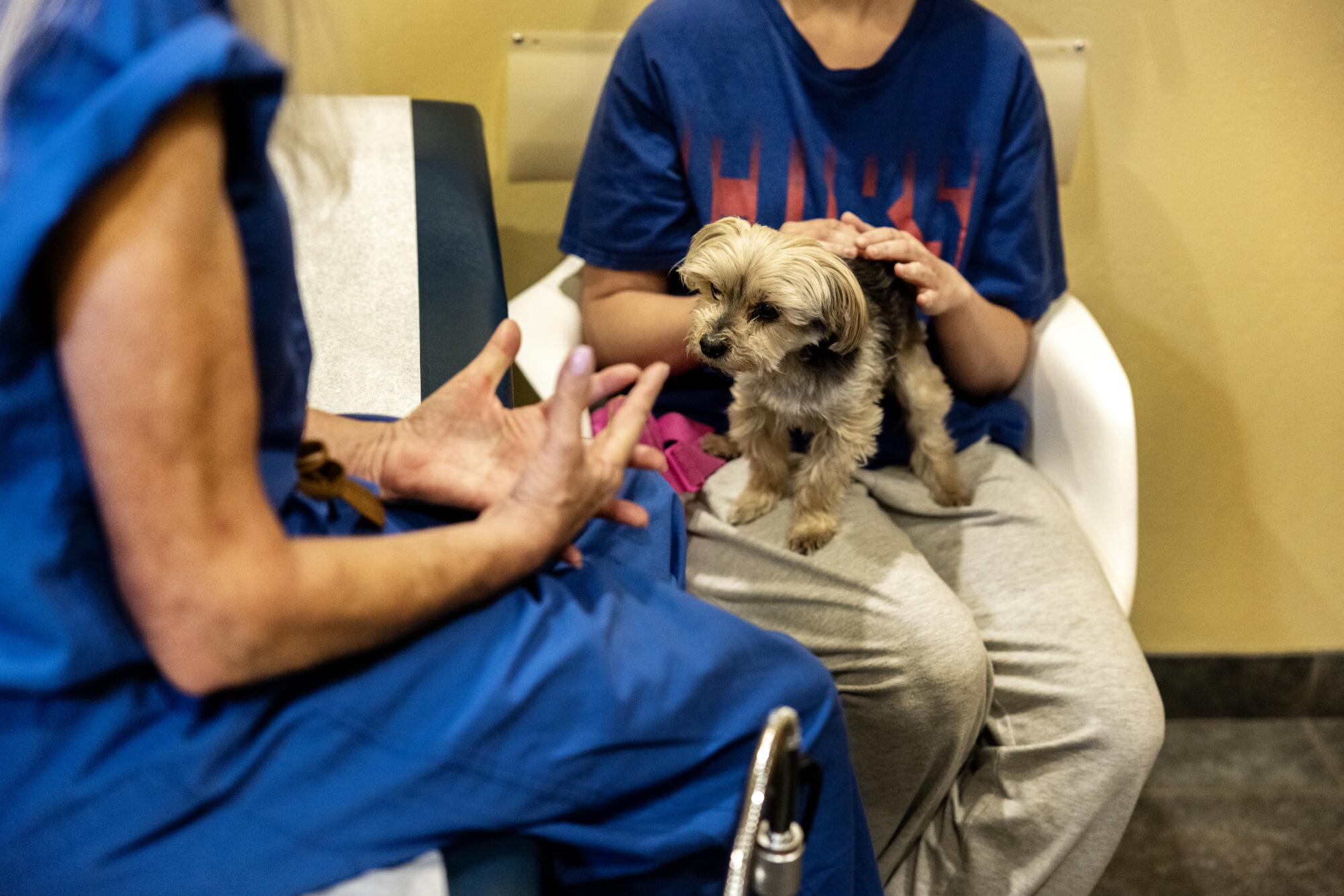
A 26-year-old patient from Phoenix strokes support dog Scooter in an exam room as Dr. Barbara Zipkin discusses her options for an abortion. The patient found out she was pregnant two days after the Arizona Supreme Court reinstated an 1864 law banning abortion.
“It has just been draining, in that sense of like, wow — this would happen this week,” the patient said.
She said that as Christians, her family vehemently opposes abortion and would support her if she decided to have a baby. The woman said she and her partner decided to keep the abortion private.
“It’s definitely confusing and emotional, considering, like, my upbringing,” she said. But referring to the escorts outside who welcomed her, she added, “it’s also encouraging, in a sense, because you do feel this community.”
Politics
How the Senate Voted on Foreign Aid to Ukraine, Israel and Taiwan

The Senate on Tuesday passed the long-stalled $95.3 billion package of aid to Ukraine, Israel and Taiwan, along with legislation that could lead to a ban on TikTok, clearing the measure and sending it to President Biden for his signature.
Note: Three senators did not vote.
Answer
Democrats
Republicans
Independents
Total
Bar chart of total votes
0
0
0
0
0
0
0
0
The overwhelming vote reflected broad bipartisan support for the measure, which passed the House on Saturday by wide margins after a tortured journey through Congress that was met with right-wing resistance.
The measure includes $60.8 billion for Ukraine; $26.4 billion for Israel and humanitarian aid for civilians in conflict zones, including Gaza; and $8.1 billion for the Indo-Pacific region. It also would impose a new round of sanctions on Iran, and require the sale of TikTok by its Chinese owner or ban the app in the United States.
The measure had been stalled for months on Capitol Hill, where right-wing Republicans opposed to the aid for Ukraine pressured Speaker Mike Johnson not to allow it to be considered unless their demands for a severe border enforcement bill were met.
But when Republicans, egged on by former President Donald J. Trump, rejected linking it to a bipartisan border deal, the Senate passed the foreign assistance package on its own in February and pressured the House to do the same.
It took Mr. Johnson two additional months to figure out a way to steer around his right flank and do so. He used a convoluted maneuver in which the House cast separate votes to push through the pieces of the package and sent them to the Senate as one bill.
The TikTok provision was included as part of an effort to sweeten the deal for conservatives. Lawmakers have repeatedly cited the potential for Beijing to gain access to U.S. user data or to use the app for propaganda, including ahead of this year’s presidential election.
How Every Senator Voted
Politics
Anti-Israel mob stages 'seder on the street’ near Schumer’s home in NYC
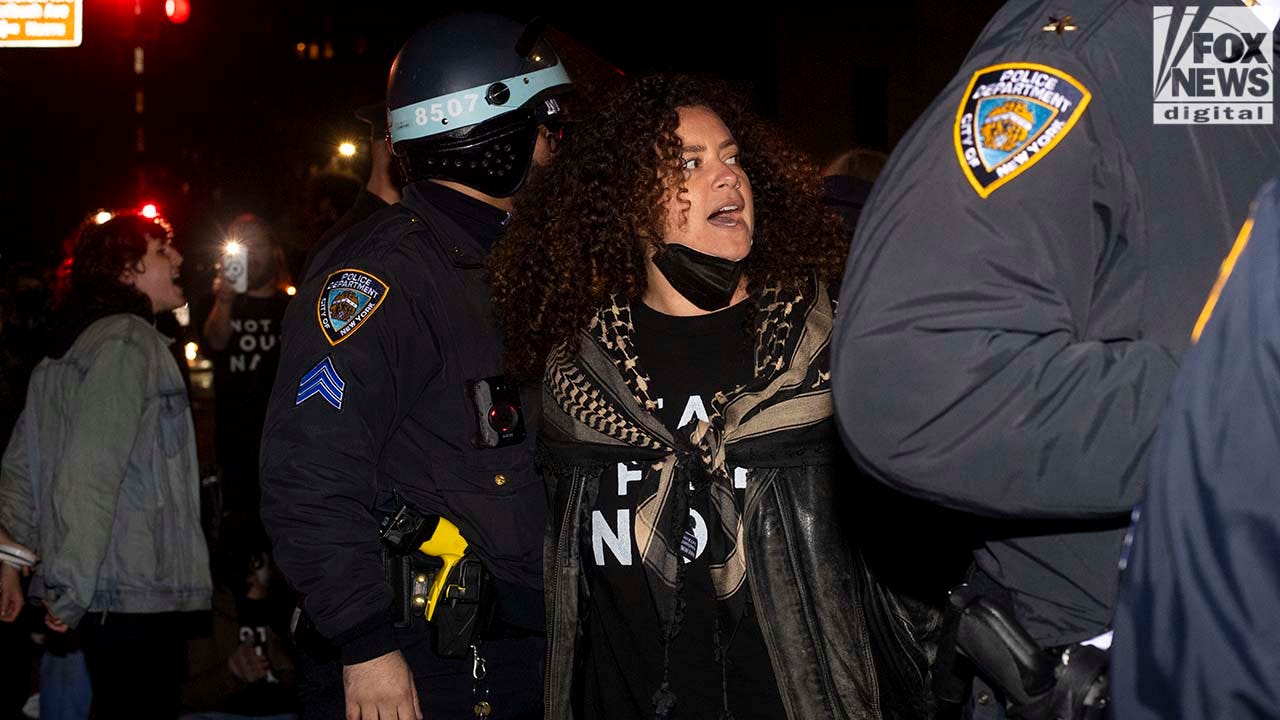
Anti-Israel agitators staged a “sedar on the street” protest in front of the Brooklyn home of Senate Majority Leader Chuck Schumer in protest of American support for Israel.
The protests came after the Senate passed a $95 billion emergency foreign aid package to Israel, Gaza and Ukraine.
Organized by pro-Palestinian groups, the protest was described as a “seder on the street” for the second night of the week-long Jewish Passover.
Photos from the protest showed large groups of demonstrators gathering in front of Schumer’s Brooklyn, New York home.
COLUMBIA UNIVERSITY RESPONDS AFTER ROBERT KRAFT SAYS HE’S PULLING SUPPORT OVER ANTISEMITIC VIOLENCE
WATCH:
The protesters urged Schumer to support an end to the U.S. providing weapons to Israel for its ongoing conflict in Gaza.
Following speeches from pro-Palestinian leaders, several people were arrested by New York Police Department (NYPD) officers.
The NYPD did not immediately respond to Fox News’ request on how many protesters were arrested.
COLUMBIA PROTESTS ARE ‘WRITING ON THE WALL’ ABOUT ANTISEMITISM ON CAMPUSES, STUDENT ORGANIZATION FOUNDER SAYS
The demonstrators at the Senate majority leader’s house came as New York City has faced an eruption of anti-Israel protests.
Since Friday, hundreds of students and others have been arrested at Columbia, Yale, New York University and other schools.
More than 100 students were arrested at Columbia University last week, and the prestigious university has decided to cancel in-person classes in an attempt to defuse tensions.
-

 Politics1 week ago
Politics1 week agoNine questions about the Trump trial, answered
-

 World6 days ago
World6 days agoIf not Ursula, then who? Seven in the wings for Commission top job
-

 World1 week ago
World1 week agoHungary won't rule out using veto during EU Council presidency
-

 Movie Reviews1 week ago
Movie Reviews1 week agoFilm Review: Season of Terror (1969) by Koji Wakamatsu
-

 World1 week ago
World1 week agoCroatians vote in election pitting the PM against the country’s president
-

 World1 week ago
World1 week agoGroup of EU states should recognise Palestine together, Michel says
-

 Politics6 days ago
Politics6 days agoTrump trial: Jury selection to resume in New York City for 3rd day in former president's trial
-

 World1 week ago
World1 week agoThe Take: How Iran’s attack on Israel unfolded










